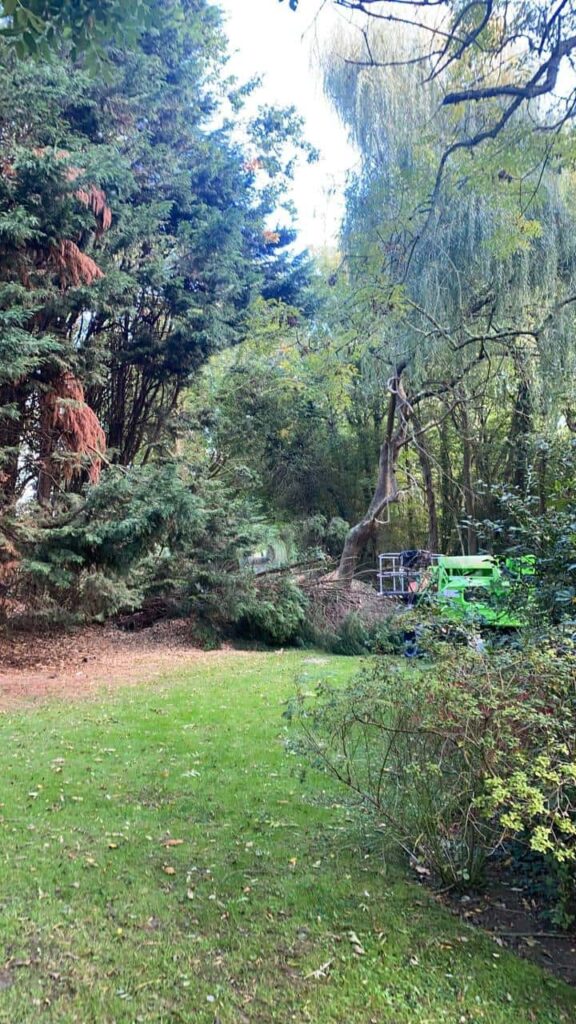Tree felling is a complex task that requires skill, precision, and, above all, safety considerations. However, when it comes to felling trees in difficult terrain, the challenges intensify. Steep slopes, rocky ground, limited access, and even proximity to structures can all complicate the process, necessitating specialised techniques and equipment. At Ipswich Tree Surgeons, we provide professional tree felling services in Ipswich, Suffolk, even in the most challenging landscapes. This blog explains the expertise needed to safely and efficiently handle tree felling in difficult terrain.
Understanding the Challenges of Difficult Terrain
Felling trees in difficult terrain introduces several hazards and logistical challenges that require professional assessment and planning. These include:
- Limited Access: Dense foliage, uneven ground, or lack of clear pathways can make it hard to bring in equipment or personnel. Limited access also restricts options for safely removing felled trees.
- Unstable Ground: Steep slopes, loose soil, or rocky surfaces can make footing treacherous for tree surgeons, posing a high risk of slips, falls, and injuries. Additionally, unstable ground may affect the direction and speed of a tree’s fall.
- Nearby Structures and Utilities: Trees located near buildings, power lines, or other utilities demand extra caution to prevent damage. In these cases, the felling process often needs to be more controlled and gradual.
- Environmental Considerations: Wet or muddy ground, dense undergrowth, or proximity to water bodies can make it difficult to manoeuvre equipment. In these conditions, environmental awareness and conservation are also essential.
- Wildlife Protection: Working in natural habitats often involves taking measures to protect local wildlife, ensuring that the felling process does not disrupt nesting birds or other protected species.
Essential Techniques for Safe and Efficient Tree Felling in Difficult Terrain
- Site Assessment and Planning
Before any felling takes place, a thorough assessment of the site is essential. This involves evaluating the tree’s size, health, and angle of growth, as well as identifying potential hazards. At Ipswich Tree Surgeons, our team carefully plans the felling strategy, taking into account all environmental factors and terrain challenges. A well-planned approach minimises the risk of accidents and ensures that the task is completed with minimal disruption.
- Sectional Felling and Rigging
When trees are located in confined spaces or near obstacles, sectional felling is often the best approach. This method involves dismantling the tree in smaller, manageable sections, typically starting from the crown and working downwards. Using ropes and rigging equipment, our team safely lowers each cut section to the ground, avoiding damage to surrounding areas.
Rigging requires precise knowledge of tree dynamics and the forces involved, as well as the ability to select appropriate anchor points and control rope tension. For this reason, sectional felling should only be undertaken by qualified tree surgeons with experience in challenging environments.
- Use of Specialist Equipment
Difficult terrain often calls for specialised equipment. In some cases, cranes or hoists are used to remove heavy sections of a tree without disturbing the surrounding ground. Winches and pulleys are essential for controlling the descent of branches and trunks on slopes. For remote or hard-to-reach locations, smaller, portable chainsaws or even manual saws are used to minimise impact and navigate tight spaces.
At Ipswich Tree Surgeons, we invest in high-quality, specialised equipment, allowing us to handle complex tree felling projects efficiently and safely. Our team is trained to use this equipment with precision, ensuring minimal disruption to the terrain and surrounding vegetation.
- Directional Felling Techniques
In open spaces, directional felling is used to guide a tree’s fall in a predetermined direction, helping it to fall safely away from obstacles. However, in challenging terrain, this technique becomes more nuanced, with cuts made to control the speed and direction of the fall based on the slope and ground conditions.
Directional felling requires precise angle cuts, often using hinge wood to control the tree’s descent. Understanding how different types of wood react to pressure is crucial in this method, as is the ability to predict the tree’s behaviour. This level of expertise is particularly important when working in steep or uneven landscapes where gravity can affect the tree’s fall.
- Environmental Protection and Conservation
Responsible tree felling also involves taking measures to protect the surrounding ecosystem. Ipswich Tree Surgeons is committed to sustainable practices, ensuring minimal impact on local wildlife and habitats. Before starting any work, we conduct an environmental assessment to identify any sensitive areas or protected species. Our team then adapts its approach to safeguard these areas, preserving the natural beauty of Ipswich, Suffolk, and maintaining biodiversity.
- Safety Precautions and Emergency Preparedness
Working in difficult terrain can be unpredictable, which makes safety paramount. Our team follows strict safety protocols, including the use of personal protective equipment (PPE), regular equipment inspections, and adherence to safe cutting techniques. Furthermore, each tree felling project includes an emergency preparedness plan, allowing us to respond quickly in the event of unforeseen issues, such as shifting ground or adverse weather conditions.
The Importance of Hiring Professionals for Tree Felling in Difficult Terrain
Tree felling in challenging environments is not a task for amateurs. Attempting to fell trees in difficult terrain without professional expertise can lead to serious injuries, property damage, and costly repairs. When you choose Ipswich Tree Surgeons, you’re opting for a team of certified professionals with the experience, skills, and equipment to handle any tree felling project safely and efficiently.
Our comprehensive approach includes:
- Site Assessments and Risk Evaluations: Our team evaluates all potential risks and plans the safest approach to felling, minimising hazards and ensuring the project’s success.
- Experienced Tree Surgeons: Our tree surgeons are trained in advanced felling techniques, including sectional felling and directional cuts, which are essential for complex terrains.
- Environmental Consideration: We respect the natural landscape and work carefully to protect the surrounding ecosystem.
- Fully Insured Services: For peace of mind, our services are fully insured, covering all aspects of the project.
Conclusion
Tree felling in difficult terrain requires a blend of skill, planning, and specialised equipment to ensure the safety and success of the project. Whether it’s a tree growing on a steep slope or one with limited access near structures, professional expertise is essential to handle the complexities involved. At Ipswich Tree Surgeons, we bring extensive experience and a commitment to safety to every tree felling project in Ipswich, Suffolk.
If you need assistance with tree felling in challenging conditions, contact Ipswich Tree Surgeons today to discuss your requirements. Our team is here to provide safe, efficient, and environmentally responsible tree care solutions.
Call us on: 01473 943 097
Click here to find out more about Ipswich Tree Surgeons
Click here to complete our contact form and see how we can help with your tree needs.

